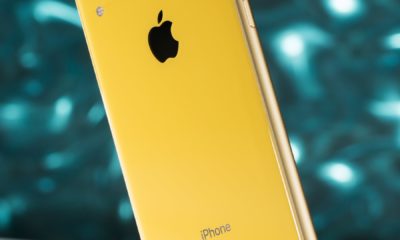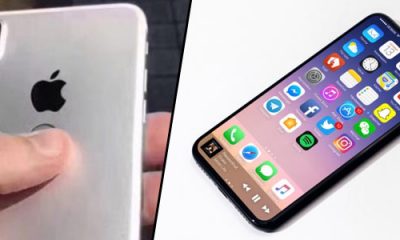World
As FBI hacks into Apple iPhone, fears rise about users’ security

 Washington/New Delhi: As the news spread of the Federal Bureau of Investigation (FBI) hacking into the encrypted Apple iPhone of one of the terrorists involved in California shooting, a top US security firm has expressed fears of backdoor approach to put users’ security at hackers’ mercy.
Washington/New Delhi: As the news spread of the Federal Bureau of Investigation (FBI) hacking into the encrypted Apple iPhone of one of the terrorists involved in California shooting, a top US security firm has expressed fears of backdoor approach to put users’ security at hackers’ mercy.
In a statement shared with IANS on Tuesday, US software security firm Symantec Corporation said that while it understands the concerns expressed by some members of law enforcement, the firm does not support any initiative that would intentionally weaken security technologies.
“Putting backdoors or introducing security vulnerabilities into encryption products introduces new avenues of attack, and reduces the security of the broader Internet. We are committed to supporting law enforcement efforts to protect citizens and organizations online, without compromising the integrity and security of encryption technology,” the firm said.
According to media reports, a third party helped the FBI crack the security function without erasing contents of the iPhone used by Syed Farook. Farook, along with his wife Tashfeen Malik, planned and executed the December 2, 2015, shooting that left 14 people killed at San Bernardino, California.
“This case should never have been brought. We will continue to help law enforcement with their investigations, as we have done all along, and we will continue to increase the security of our products as the threats and attacks on our data become more frequent and more sophisticated,” Apple said in a statement.
“This case raised issues which deserve a national conversation about our civil liberties, and our collective security and privacy,” the statement said.
From the beginning, “we objected to the FBI’s demand that Apple build a backdoor into the iPhone because we believed it was wrong and would set a dangerous precedent. As a result of the government’s dismissal, neither of these occurred,” it added.
Apple believes deeply that people in the US and around the world deserve data protection, security and privacy. Sacrificing one for the other only puts people and countries at greater risk.
In a earlier report released this year, Symantec’s security intelligence team had predicted that the opportunities for cybercriminals to compromise Apple devices will grow in 2016.
Apple devices have experienced a surge in popularity in recent years. “This increase in usage has not gone unnoticed by attackers. A rising number of threat actors have begun developing specific malware designed to infect devices running Mac OS X or iOS,” the report said.
Although the number of threats targeting Apple operating systems remains quite low when compared to the company’s main competitors (Windows in the desktop space and Android in mobile), the amount uncovered has grown steadily in recent years.
“In tandem with this, the level of Apple-related malware infections has spiked, particularly in the past 18 months,” the report predicted.
“Apple users should not be complacent about security and change their perception that Apple devices are free from malware — this perception opens up opportunities for cybercriminals to take advantage of these users,” Symantec said.
Recently, Apple CEO Tim Cook, referring to the ongoing battle with the US government over encryption to unlock an iPhone, reiterated the company’s commitment to protect its users’ data and privacy.
Addressing a packed auditorium at its Cupertino, California-based headquarters, Cook said: “We have a responsibility to help you protect your data and your privacy. We will not shrink from this responsibility.”
“We built the iPhone for you, our customers, and for many of us it is a deeply personal device,” he told the gathering during a special launch event this month.
With the FBI hacking, the US Department of Justice (DOJ) scrapped its request for Apple Inc.’s assistance to hack into the phone of a terrorist killer.
On Monday, the federal government department, on behalf of the FBI, made the move at a US court in Central California, Xinhua news agency reported.
The two-page court filing said that the FBI had accessed data stored on the iPhone 5c.
It is now Apple’s turn to figure out, and for iPhone users to wonder, how secure is the phone and data on the device.
In this scenario, top US companies Google, Facebook and Snapchat are also expanding encryption of user data in their services.
While Whatsapp is set to roll out encryption for its voice calls in addition to its existing privacy features, Google is investigating “extra uses” for encryption in secure email.
Social networking giant Facebook too is working on to better protect its Messenger service.
The popular messaging service Snapchat is also considering a more secure messaging system.
World
Lockdowns in China Force Urban Communities to Defy Censorship and Vent Frustration Online

Shanghai’s rich middle class is leading a wave of online dissent over the strict and prolonged lockdowns imposed in various parts of the country. Chinese internet censorship is struggling as patience is wearing thin in many urban centers, coming up with creative forms of online protests.
Social Media Posts Revealing Lockdown Tension in Shanghai
Drawn-out lockdowns are nothing new in China as authorities insist with the nation’s zero-Covid policy since the start of the pandemic. Currently over This time around, however, metropolitan areas like Shanghai are increasingly difficult to keep quiet, given that its more than 25 million residents have seen weeks of total isolation along with food shortages and many other service interruptions.
Dozens of towns and reportedly over 300 million Chinese citizens have been affected by lockdowns of different severity. As expected, urban netizens have been most outspoken over their difficulties by finding creative ways to get around state censorship and bans placed on topics, news comments and spontaneous campaigns.
Shanghai residents have been using mobile proxies and hijacking seemingly unrelated hashtags to talk about healthcare issues, delivery failures and the overall severity of their situation. The “positive energy” that the Chinese government wants to transmit during the recent prolonged series of lockdowns does not come naturally to those counting food supplies and online censors are working hard to filter words, trending topics and undesired social media sharing.
WeChat groups and message threads are under constant monitoring. Posts questioning the zero-Covid approach have been quickly deleted, including by leading Chinese health experts like Dr. Zhong Nanshan. Video footage is soon censored and protests and investigations are quickly made to disappear.
Where this has not worked, officials have exposed banners with warnings and outright threats like “watch your own mouth or face punishment”, while drones have been patrolling the city skies. Yet, if anything, this has led to further tensions and unspoken confrontation with Shanghai’s educated and affluent middle class.
Creative Online Solutions Harnessing Civic Energy
Announcements by Chinese social media that they would be publishing the IP addresses of users who “spread rumors” have not helped either. Tech industry research has shown that much of Asia’s tech-savvy population has a habit of using mobile proxies and other privacy tools, quickly finding workarounds to browse the internet freely and talk to the world about the hottest topics.
The sheer volume of forbidden posts is already a challenge for the very censorship system, experts explain. Unable to track all trending hashtags, state workers overlook topics that speak about the US, Ukraine or other popular news. Linking human rights elsewhere to their situation, Chinese online dissidents establish their informal channels and “hijack” the conversation to share personal or publicly relevant information about the Covid suppression in their town.
Sarcastic and satirical posts still dominate. Others hope to evade the censors by replacing words from famous poems or the national anthem. One thing is certain – social media, when harnessed with the right creativity, has proven its ability to mount pressure on the government in even some of the most strictly controlled tech environments like China.

















